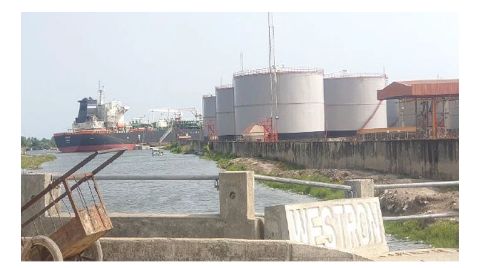As the battle to control market share in the downstream sector rages on, no fewer than 70 tank farm owners have been compelled to cease operations in the past two years, leaving their facilities abandoned and idle as retailers and station owners increasingly avoid utilising their services.
These dormant tank farms, representing 65 per cent of the total 120 approved facilities, now stand idle, with operators increasingly bypassing the storage facilities in favour of alternative trucking options.
The PUNCH also gathered that the business closure was primarily driven by the removal of the fuel subsidy by President Bola Tinubu’s administration, which led to a significant 488 per cent increase in petrol prices and affected the purchasing power of fuel marketers.
A tank farm is an area used for the storage of oil and/or petrochemical products in large tanks and often installed in locations where marine tankers can discharge their products.
From the tank farm, petroleum products are distributed to end users or further storage facilities.
According to an engineering website, Plant Engineering, the purpose of tank farms is to provide a safe environment for storing chemicals.
Various raw materials such as gasoline, crude oil, liquefied natural gas, heavy oil, naphtha and other liquid chemicals are temporarily stored while they wait to be transported by ship, rail, tank truck or pipeline for further use or processing.
In Lagos State, these tank farms are widely spread in the Apapa, Ijegun, and Ojo axes, especially Satellite Town, a densely populated area.
Before the elimination of subsidy payments on refined products on May 29, 2023, by the current administration, tank farms served as a major economic necessity, as the country depended solely on fuel imports to meet its daily petroleum demands obligations.
The need to consistently meet this obligation and ensure energy security enticed many marketers to build storage farms to store refined products and guard against price fluctuations.
In 2024, the National Bureau of Statistics showed that the cost of petrol imports rose by 105.3 per cent to N15.42tn in 2024 from the N7.51tn recorded in 2023.
Our correspondent gathered that the proliferation of these storage facilities in 2012 and its attendant negative effects affected the livelihood of residents living in Ijegun.
A report by The PUNCH in 2023 highlighted complaints by residents as they lamented the environmental and social impact, making many relocate from the area.
It was also noted most tank farms had no parking bays, leading to road blockages by tankers and trucks and the dilapidation of road networks.
An analysis of functional tank farms using data from Petroleumprice.ng, which provides real-time petrol prices, revealed that there are over 120 storage facilities listed across Nigeria.
The document obtained on Tuesday revealed that out of over 120 depots listed across Nigeria, only about 50 farms, representing 45 per cent are functional, while 70 farms, representing 65 per cent are not closed and don’t have a single litre in their storage.
Checks showed that only 50 depots displayed real-time prices, product discharge details, quantity discharged, discharge date, and loading status, which serve as indicators of whether they are still operational.


